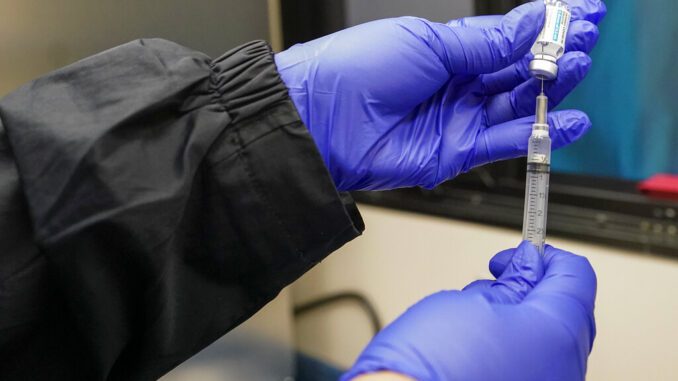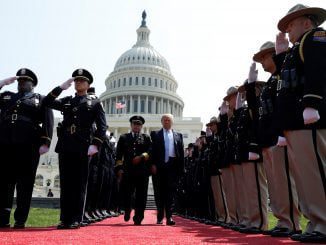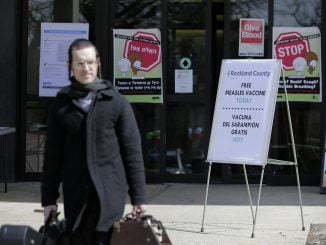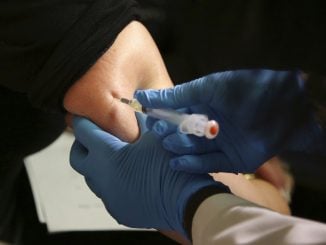
HARTFORD, Conn. — Shortly before COVID-19 vaccinations began in January at the federal prison in Danbury, Connecticut, officials held town hall meetings for inmates about the vaccines and put up informational posters around the facility.
Yet when vaccination time came, 212 of the nearly 550 inmates who were offered the shots refused to take them, according to federal prison officials, shining a light on prisoners’ skepticism of the vaccine that is permeating many correctional institutions in the country.
In Massachusetts, more than 5,500 state and county prisoners have refused the vaccines, compared with nearly 7,800 who have received the first of two doses, officials say.
Inmate advocates and researchers say prison systems need to do more to educate prisoners about the vaccines, as available data and surveys show that many inmates decline or express hesitancy about getting the shots. Efforts should include bringing in outside experts and trusted community members, especially people of color, not just passing out flyers and having talks by prison staff, they say.
“As a Black man, I … think about the history of the medical racism and experimentation with Black and brown people in this country. That resonates with people who are incarcerated,” said John Hart, a senior research associate at the Vera Institute of Justice who studies prison conditions.
“They have to do a much better job of bringing in people who are more trustworthy, such as elders in the community or people of color who have a lot of credibility,” he said. “We won’t be able to get out of this pandemic without taking prison facilities very seriously and that includes correctional staff and incarcerated people.”
Black people make up disproportionately large percentages of both prison populations and patients with severe COVID-19 outcomes. In a survey of people in prisons and jails late last year by the University of Washington’s School of Public Health, 37% of Black respondents were willing to receive the vaccine, compared with 45% of all respondents.
Complicating matters has been that states were slow to make vaccinations available to prisoners. Inmates in 45 states and Washington, D.C., are now eligible for vaccines, but several weeks ago, only about half of states were offering prisoners shots, according to the Kaiser Family Foundation. By the end of March, Arkansas and Florida had not yet begun vaccinating prisoners, while a few states say they have offered vaccinations to every adult in their prisons. Eight states have not reported how many prisoners have been vaccinated.
Nationwide, less than 20% of state and federal prisoners have been vaccinated, according to data collected by The Marshall Project and The Associated Press. That compares with about 40% of the general adult population that has received at least one shot, according to the federal Centers for Disease Control and Prevention. And prison staff have also shown high rates of declining the vaccines, which has exacerbated inmate skepticism, advocates say.
The slow rollout of vaccines in prisons came despite the CDC and public health officials recommending prioritizing vaccinations for inmates and prison staff to protect them and their communities from the coronavirus.
U.S. prisons have been coronavirus hot spots. Nationwide, more than 390,000 incarcerated people and 107,000 staff members have contracted the coronavirus over the last year, according to data collected by the AP and The Marshall Project. About 3 in 10 prisoners have tested positive for the virus, a rate much higher than that of the general population. The infections have proved fatal for more than 2,500 prisoners and nearly 200 staff members.
Efforts to persuade inmates to get vaccinated have been uneven across the country, with some going to greater lengths than others. Inmates in some prisons say they are not receiving important education.
In North Carolina, state prison officials offered incentives to inmates to get vaccinated, including five days off their sentences, credits at canteens, extra visits from relatives and more phone privileges. Half the nearly 29,000 state prisoners have received vaccination shots so far during the ongoing vaccine rollout, said John Bull, a spokesperson for the state Department of Public Safety.
“We know that there’s lots of hesitancy out there, not just in our prisons but in the country at large,” Bull said. “The prison system here in North Carolina has been working very hard to get prisoners vaccinated.”
Massachusetts state prison officials said they put together a vaccine awareness campaign with input from former inmates and health experts. It included showing prisoners videos featuring pastors and even Dr. Anthony Fauci, the nation’s top infectious-disease expert, according to the state Department of Correction.
Correction officials say about 70% of Massachusetts state inmates, not including county prisoners, have received their first shot of the vaccine.
But in Georgia, some prisoners told The Marshall Project in a survey that they received no information about the vaccine until they were asked to sign a form indicating whether they wanted to receive it. Prison officials said inmates did receive vaccine information from a CDC website.
An inmate at Danbury who refused the vaccine said he was taken to see a dental assistant who was asking prisoners if they would get shots as vaccinations were about to begin. When he asked her if she had any information about the vaccine, she said that she did not and that she wasn’t going to take it herself, he said.
“I felt nervous about not having any information, and I was concerned that the … staff member administering the vaccine wasn’t willing to take it,” the inmate said in a court filing in a lawsuit by inmates over coronavirus protections at the prison. His name was not disclosed.
The inmate said he later changed his mind and decided to get vaccinated after getting more information from relatives in the medical field and seeing others in the prison get shots — showing how talking to trusted sources outside prison can ease misgivings about the vaccines.
“This is going to require a lot more intentional education,” said David McGuire, executive director of the American Civil Liberties Union of Connecticut. “Incarcerated people have much more limited access to information. They can’t just get on their computer and search some articles, and they also cannot just go to a doctor of their choosing and talk through the pros and cons.”



